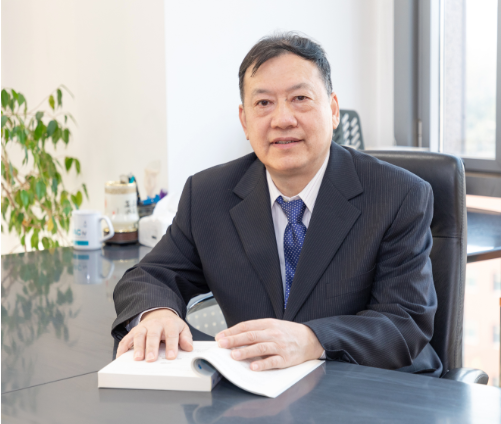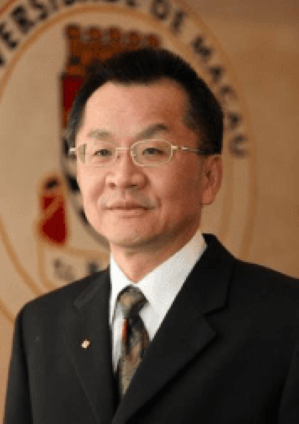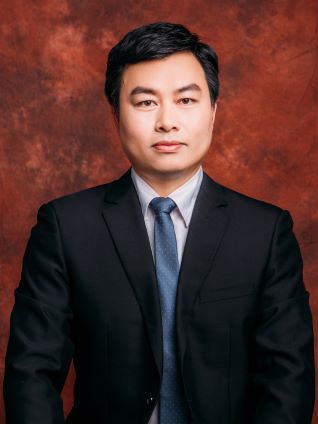Keynote Speakers


Pro. Depei Qian
Qian Depei, born in August 1952, Han nationality, Haining, Zhejiang Province, is currently a professor at the School of Computer Science, Beijing University of Aeronautics and Astronautics, and a member of the Chinese Computer Society. He received his bachelor’s degree from Xi ‘an Jiaotong University in 1977, his master’s degree from North Texas State University in 1984, and worked as a senior visiting scholar at the University of Hanover in Germany from 1991 to 1992.
He has long been engaged in computer architecture and high-performance computing system research. He solved the key technical problems of building a network computing environment based on dispersed, heterogeneous and dynamic resources, and presided over the development of the national high-performance computing environment CNGrid; A systematic method to improve the parallel programming of multiple cores is proposed, which promotes the widespread application of high performance computing. Served as the overall leader of national major projects in the direction of high performance computing for a long time, presided over the formulation of strategic objectives and implementation plans, established the architecture and technical plans of high performance computers, and realized the leapfrog development of high performance computers. Related achievements have won 9 science and technology awards above provincial and ministerial level, including the second prize of National Science and Technology Progress (2007,2020, ranking first), 30 authorized invention patents, and more than 400 published papers.

Prof. Junlong Chen
Dr. C. L. Philip Chen is a distinguished national expert, Dean and Chair Professor of School of Computer Science, South China University of Technology. Professor Chen is the vice chairman of the Chinese Association of Automation, the director of the Health Intelligence and Digital Parallel Human Engineering Center of the Ministry of Education, the director of the Key Laboratory of Computational Intelligence and Cyberspace Information of Guangdong Province, the co-chairman of the Guangdong Artificial Intelligence Industry Association, and the deputy director of the Pazhou Laboratory. He is an IEEE Fellow, AAAS Fellow, IAPR Fellow, AcademyEuropaea, and Fellow of the European Academy of Sciences and Arts Arts), Chinese Society of Automation (CAA), Chinese Society of Artificial Intelligence (CAAI), and Hong Kong Institution of Engineers (HKIE) Fellow. Professor Chen is a former director of IEEE Trans. on Cybernetics (2020-2021), and IEEE Trans. on Systems, Man, and Cybernetics: Systems (2014-2019) editor-in-chief of two top SCI journals, was the international general President of the society (2012-2013), and is also the editorial board of the domestic journals CAAI Trans on AI, Science in China, and Acta Automatica.
In 2018, Professor Chen received the IEEE Norbert Wiener Award for Cybernetics in System Science, the 2021 IEEE Joseph Wohl Lifetime Achievement Award, and the Wu Wenjun Award for Outstanding Contribution to Artificial Intelligence of the Chinese Society for Artificial Intelligence. Professor Chen’s research interests are mainly in Intelligent Systems and control, computational intelligence, Mixed Intelligence, and data science. He is a global Highly Cited Scientist in Clarivate Analytics for 5 consecutive years from 2018 to 2022 (2018 in Computer Science, 2018 to 2022 in Engineering and Computer Science).

Prof. Zhihui Zhan
Zhihui Zhan, Ph.D., IEEE Senior Member, ACM, CCF, CAAI Member, He is currently a professor in the School of Computer Science and Engineering of South China University of Technology, doctoral supervisor, winner of National Outstanding Young Science Fund, Elsevier China Highly Cited Scholar in Computer Science Field, member of the evaluation group of Artificial Intelligence experts of the Information Department of National Natural Science Foundation, the first batch of “Young Pearl River Scholars” in Guangdong Province, and the Outstanding Young Science Foundation of Natural Science in Guangdong Province Gold winner and Guangdong special support high-level talent science and technology innovation young top talent. He has won the Wu Wenjun Award for Outstanding Youth in Artificial Intelligence, the IEEE Computational Intelligence Society (CIS) Global Outstanding Doctoral Dissertation Award and the China Computer Society (CCF) Outstanding doctoral Dissertation Award. He is currently Vice chairman of Guangzhou Computer Society, Vice Chairman of ACM Guangzhou Branch, Deputy Director of Graphics Big Data Committee of China Graphics Society (CGN), member of Artificial Intelligence and Pattern Recognition Committee of China Computer Society, member of Machine Learning Committee of Chinese Society of Artificial Intelligence (CAAI), and adaptive Dynamic Planning and Management of Chinese Society of Automation (CAA) Member of the Professional Committee on Reinforcement Learning.
His research interests include artificial intelligence, evolutionary computing, swarm intelligence, cloud computing and big data. At present (until April 2020), he has published (accepted) more than 100 papers in international journals and conferences, including more than 40 papers in the top international journals in the field of computer in the IEEE Transactions series. The paper has been cited more than 6,000 times by international peers (Google Scholar), including more than 3,000 SCI citations. Eight papers were selected as ESI highly cited papers, including one ESI hot paper (62 ESI hot papers in the global computer field in February 2014).
The research results have been positively evaluated and applied by international peers. They include the founder of the ant Colony Algorithm (Dorigo), the founder of Tabu Search (Von Neumann Theory Prize winner, Glover), Fellow of the Indian National Academy of Sciences and the Indian Academy of Engineering (IEEE Fuzzy Systems Pioneer Award winner, Pal, Pedrycz, IEEE Fellow and other renowned scholars commented on the “encouraging results”; It has been promoted by IEEE Computational Intelligence Society as the “Computational Intelligence Publishing Focus”. It was used by the European Space Agency scientists to optimize the parameters of the mass spectrometer of the comet probe. At the same time, it is also widely used by domestic and foreign scholars in the optimization problems in many fields such as biomedicine, physical optics, chemical production, image processing, signal processing, and so on, to promote the development of related fields.
Professor Zhan serves as the international journal IEEE Transactions on Evolutionary Computation (SCI, IF=10.629, JCR Region 1, the flagship leading international journal in the field of evolutionary computation. Associate Editor of JCR Computer – No.1 in the field of Artificial Intelligence) and Neurocomputing (SCI, IF=3.241, JCR Region 1, the authoritative international journal in the field of neural networks), Invited to be the Program Chair of ICACI 2019, the Publicity Chair of ICICIP 2018 and BIC-TA 2018, and the Special Sessions Chair of ICIST 2017 and ICONIP 2018, AAAI 2018/2017, GECCO 2020/2017, ICSI 2016, TAAI 2015, SMCE 2015, ICSI 2015, ICSI 2014, APSCC 2014, TAAI 2014, TAEA 2013 and CCDM Member of the Procedure Committee of international/domestic academic conferences such as 2014, It is a Special Session Proposer of the IEEE Congress on Evolutionary Computation (CEC 2014/2016/2019), an authoritative international conference on evolutionary computation and swarm intelligence. He was invited to make presentations at domestic and foreign academic conferences and seminars, such as NCE 2019, DEOTA 2018, HCP 2018, IWIOSC 2017, BIC-TA 2016, ECOLE 2015, etc.

Prof. Yuncheng Jiang
Jiang Yuncheng, second-level professor, doctoral supervisor, Distinguished Professor of Pearl River Scholars, Dean of School of Computer Science, Vice Minister of Engineering Department, Dean of School of Artificial Intelligence and Dean of School of Software, Director of Guangdong Intelligent Science Engineering Technology Research Center, Deputy director of Guangdong Data Science Engineering Technology Research Center, Deputy Chairman of the Computer Major Teaching Steering Committee of Guangdong Province, Member of the Steering Committee of KSEM (International Conference on Knowledge Science, Engineering and Management), Vice Chairman of IEEE Task Force on Educational Data Mining, Distinguished member of China Computer Society (CCF), Executive member of China Computer Society’s Special Committee on Artificial Intelligence and Pattern Recognition, Executive member of Theoretical Computer Science Special Committee, Standing member and Secretary General of Discrete Intelligent Computing Special Committee of Chinese Society for Artificial Intelligence (CAAI), member of Mental Computing Special Committee, Executive director of Guangdong Computer Society, Deputy director of Artificial Intelligence Special Committee and Big Data Special Committee, Executive director of Guangdong Communication Society, supervisor of Guangdong Artificial Intelligence Industry Association, Director of Guangdong Artificial Intelligence and Robotics Society, Co-chair of CCF NCTCS 2023 Conference, Co-Chair of KSEM 2023 and CAAI CDIC 2023 Conference Procedure Committee, Co-Chair of PRICAI 2024 Conference Forum, Track Chair for Special Track on Data Intelligence & Knowledge Mining at ADMA 2024. In 2004, he graduated from the Institute of Computing Technology, Chinese Academy of Sciences with a doctorate degree in computer software and theory. 2007 Postdoc of School of Mathematics and Computing Science and School of Information Science and Technology, Sun Yat-sen University. He was promoted to professor of Computer science in 2007. In 2009, he worked in the School of Computer Science, South China Normal University. In 2010, he was selected as the provincial training object of Guangdong Province’s “Thousand Hundred and Ten Projects”, in 2012, he was selected as the Ministry of Education’s “New Century Outstanding Talents Support Program”, in 2013, he was appointed as the doctoral supervisor of South China Normal University, and in 2018, he was approved as the Distinguished Professor of Pearl River Scholars (Software engineering discipline). Presided over or completed more than 10 national or provincial or ministerial level projects, As the first author or corresponding author in TKDE, TNNLS, IPM, Neural Networks, Information Sciences, Fuzzy Sets and Systems, TLT, TCSS, TBD, KAIS, KBS, More than 100 papers have been published in important journals such as EAAI, IJIS, AAAI, IJCAI, CIKM, ECML PKDD, KSEM, Journal of Computer Science and Journal of Software and other important international conferences (two of the first author papers were selected as ESI highly cited papers). He won the second prize of Science and Technology Progress of Guangdong Province, the second prize of Teaching Achievement Award of Guangdong Province, the first prize of Excellent Academic Paper of Science and Technology Innovation of Southern Guangdong Province, the Best Paper Award of KSEM 2022 and the first prize of Science and Technology Award of Guangdong Artificial Intelligence Industry Association (Natural Science Award).
His research interests include knowledge graph, graph neural network, graph computation, natural language processing and data science.

Prof. Hui Li
Hui Li is a Professor of Peking University、Chief Information Scientist of IASTIC(International Academician Science & Technology Innovation Center); Foreign Academician of Russia Academy of Natural Science、Member of Expert Committee of World Digital Tech. Academy under guidance of UN Commission on Sci.&Tech. for Developments、Fellow of IET、Senior Member of IEEE & China CCF. He received his B.Eng. and M.S. degrees from School of Information Eng., Tsinghua University, Beijing, China, in 1986 and 1989 respectively, and Ph.D. degree from Dept. of Information Engineering, The Chinese University of Hong Kong in 2000. He was Director of Shenzhen Key Lab of Information theory & Future Internet architecture, Director of PKU Lab of CENI (China Environment for Network Innovations), National Major Research Infrastructure.
He proposed the first co-governing future network arch. ‘MIN’based on blockchain technology and implemented its prototype on Operator’s Network in the world,and MIN was obtained the award of World Leading Internet Scientific and Technological Achievements by the 6th World Internet Conference on 2019, WuZhen, China. He was invited as Guest Editor of ZTE COMMUNICATIONS March 2020 Vol. 18 No. 1 (Issue 69),with topic: Domain Name and Identifier of Internet: Architecture & Systems. The first English monograph by theme of “Cyberspace UN”in the world has been published by Springer Publisher with title:《Co-governed Sovereignty Network: Legal Basis and Its Prototype & Applications with MIN Architecture》. His research interests include network architecture, cyberspace security, blockchain,distributed storage. As the first author, He has published four Monographs with field on Future network architecture, Consensus Algorithms on Blockchain, Distributed storage theory and system.